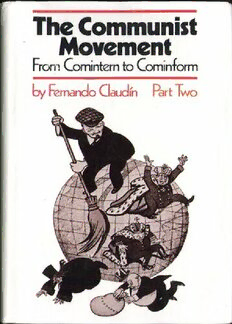
The Communist Movement: From Comintern to Cominform, Part Two: The Zenith of Stalinism PDF
Preview The Communist Movement: From Comintern to Cominform, Part Two: The Zenith of Stalinism
$27.00 the set £11.90 the set The Communist Movement: From Comintern to Cominform by Fernando Claudín Translated by Brian Pearce Part One: The Crisis of the Communist International Part Two: The Zenith of Stalinism Modern history, the history of Europe and much of the rest of the world since World War 1, cannot be understood apart from the role of the Communist movement. And the world Communist movement is known almost exclusively from the woefully inaccurate ac- counts and interpretations of orthodox, anti- Communist scholars on the one side and Communist scholars on the other. In these contrasting interpretations, the element of agreement often outweighs the points of con- flict: this element of agreement is a mythology that describes world Communism, through- out its existence, as a dedicated insurgent phenomenon, “revolutionary” in its own eyes, “subversive” in those of its opponents. Fernando Claudín’s exhaustive and mas- terful history, the first adequate study from the Marxist viewpoint, will finally destroy all such tottering mythologies. The author here combines, in this massive work, the disci- plines of historical scholarship with the revo- lutionary standpoint from which alone it is possible to develop a critique of the theory and practice of the world Communist move- ment. His meticulous documentation offers to the reader a guarantee of historical accu- racy, while the revolutionary convictions with which the work is suffused bring to life the issues and battles it interprets and relives. The first volume opens with the dissolution of the Communist International in 1943, dur- (continued on back flap) THE COMMUNIST MOVEMENT FERNANDO CLAUDIN THE COMMUNIST MOVEMENT FROM COMINTERN TO COMINFORM (cid:1) PART TWO THE ZENITH OF STALINISM Translated by Francis MacDonagh MONTHLY REVIEW PRESS NEW YORK AND LONDON Part One copyright © 1975 by Brian Pierce Part Two copyright © 1975 by Francis MacDonagh All rights reserved Originally published by Editions Ruedo Ibérico, copyright © 1970 by Editions Ruedo Ibérico Library of Congress Cataloging in Publication Data Claudin, Fernando. The Communist movement. Translation of La crisis del movimiento comunista. Includes bibliographical references and index. 1. Communism—History. I. Title. HX40.C59813 335.43 74-25015 ISBN 0-85345-366-7 First Printing Monthly Review Press 62 West 14th Street, New York, N.Y . 10011 21 Theobalds Road, London WC1X 8SL Manufactured in the United States of America From Marx to Mao M L Digital Reprints 2017 www.marx2mao.com CONTENTS PART TWO: THE ZENITH OF STALINISM . REVOLUTION AND SPHERES OF INFLUENCE From Comintern to Cominform The Revolution Frustrated (France) The Revolution Frustrated (Italy) Revolutions without Permission: Criticisms of French and Italian Opportunism From the ‘Grand Alliance’ to the ‘Two Camps’ Questions and Conjectures . THE COMINFORM The Satellite Revolutions The Cominform and the New Tactics General Retreat of the Communist Movement in the West . THE YUGOSLAV BREACH The Setting-up of the Bureaucratic Police Dictatorship in the Satellites The Heretical Revolution The Trials The Campaign against Titoism in the Western Communist Parties . THE EAST TAKES OVER The Chinese Revolution and the ‘Grand Alliance Revolutionary War or ‘National Unity’ The Bogey of Chinese ‘Titoism’ The Sino–Soviet Alliance v . THE NEW WORLD BALANCE The ‘Peace Fighters’ Stalemate in the ‘Cold War’ Assessment of the Cominform Period Epilogue Notes to Part Two 1 Index 55 vi
